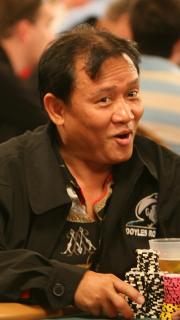
We began this discussion with some history on the unsavory elements of poker.
Today, some case studies of "marginal" situations where these elements present themselves. Cases like these make nice "intuition pumps" - they get you thinking.
Live Cash Games
Case 1: The guy on your left lifts his cards awkwardly and you can see them.
Should you tell him? Is it okay to peek ... once in a while? If you tell him but he still does it, can you look now? When is it legit to use the knowledge gained? How stupid does someone have to be before you can, in good conscience, take advantage of him?
Case 2: You install a small mirror in the table so you can see your opponent's hole cards.
This scam, as Russ Georgiev reported (see Part I in this series), was once common. It was set so that the player to the left of the dealer could see each card as it came off the deck. And, yes, the house was in on the deal.
Notice, you're getting the same information as Case 1 but it feels different doesn't it?
Case 3: Two guys sit in your game. They're clearly friends. They're heads-up in a hand, look at each other and proceed to check it down.
Does this make you suspicious? Is this inappropriate? Do you worry that later you might find yourself in a three-way pot with the two of them? What do you do? Tell them you do not approve? Call the floor? Get up and leave? Say, "To hell with it," and continue playing?
Your answer is important. How you deal with these situations will make its mark on the game. Culture and its moral codes are only as strong as the collective actions of all participants.
Case 4a: You notice a marked card. It is an ace. You don't tell the dealer.
Case 4b: You see a player mark an ace. You don't tell the dealer.
Case 4c: You mark an ace.
In all three the information available is the same. All feel wrong but not equally so. Most rank (c), being an act of commission, as the most egregious. They rank (a) and (b), being acts of omission, as less blameworthy. In courts of law they are also treated differently.
But (a) still feels different from (b). In (a) you don't know who did it. It could have been an accident. The second is different; you know the card was deliberately marked and you know who did it.
Suppose a hand pops up with an ace on board and you have a strong draw. You see the marked card in the hand of the guy who did it. You stretch the implied odds in this hand because you know if you hit you're going to get paid off. Is this legit? He's getting his comeuppance, right? Well, maybe.
Now, same situation but the ace is held by some innocent slob who has the misfortune to be holding it? Worse than before? Same?
Okay, let's tweak your intuitions some more.
Live Tournaments
Case 1: Guy buys in for $20+2 with starting stacks $3,000. He starts riffling his chips and spots two dusty grayish chips; someone mistakenly put two $5,000 chips in his stack. He surreptitiously slips them into his pocket to be retrieved later.
Case 2: A regular notices that the house is using the same chips for this MTT and the $200+20 buy-in each Saturday. He goes deep and quietly slips two $5,000 chips into his pocket to be retrieved on the weekend.
Both are unethical. But equally so? The second one feels worse (to me anyway). For one, it is a crime of commission (going "south" with chips) while the first is one of "omission" (failing to alert the floor about the 5k chips).
Moreover, because of the higher payouts on Saturday, the T-$10k theft in the second case becomes "grand" larceny while the same T-$10k theft in the former is "petty" larceny.
Note: in both situations the people getting hosed are the other players, not the house.
FWIW, this latter case has been known to occur in rooms that do not have different chip sets and are so busy that no one counts down the chips after the tournament is over.
Case 3a: Two (or more) players form a partnership and agree to "ship" chips to each other if the circumstances are right.
Case 3b: Rebuy tournament. Two (or more) players form a partnership and push chips to one (or more) of their group and then rebuy.
Case 3c: A top pro takes on apprentices. They have to donk off chips to their guru. They are told that this is part of their training.
All three of these involve chip dumping but, to me, they don't feel equally unethical. I find 3c to be the most egregious act and 3b more unconscionable than 3a.
But all violate the basic principles of the game. They are also difficult to detect. All almost certainly occur, although with unknown frequency.
Note that in these instances involving tournaments, the people getting screwed are the other players whose EV for the event is reduced.
Consequently, the burden of discovery lands on the players. The house is on the lookout for cheating that impacts their bottom line, but management has little investment in poker and cannot be expected to show the same vigilance they display at the roulette wheel or the blackjack tables.
Next time we'll examine the Internet. In cyberspace gambits ranging from a gentle stretching of the guidelines to flat-out criminal behavior have been seen. And in many instances it isn't clear what the proper course of action is.
Visit www.pokerlistings.com


















